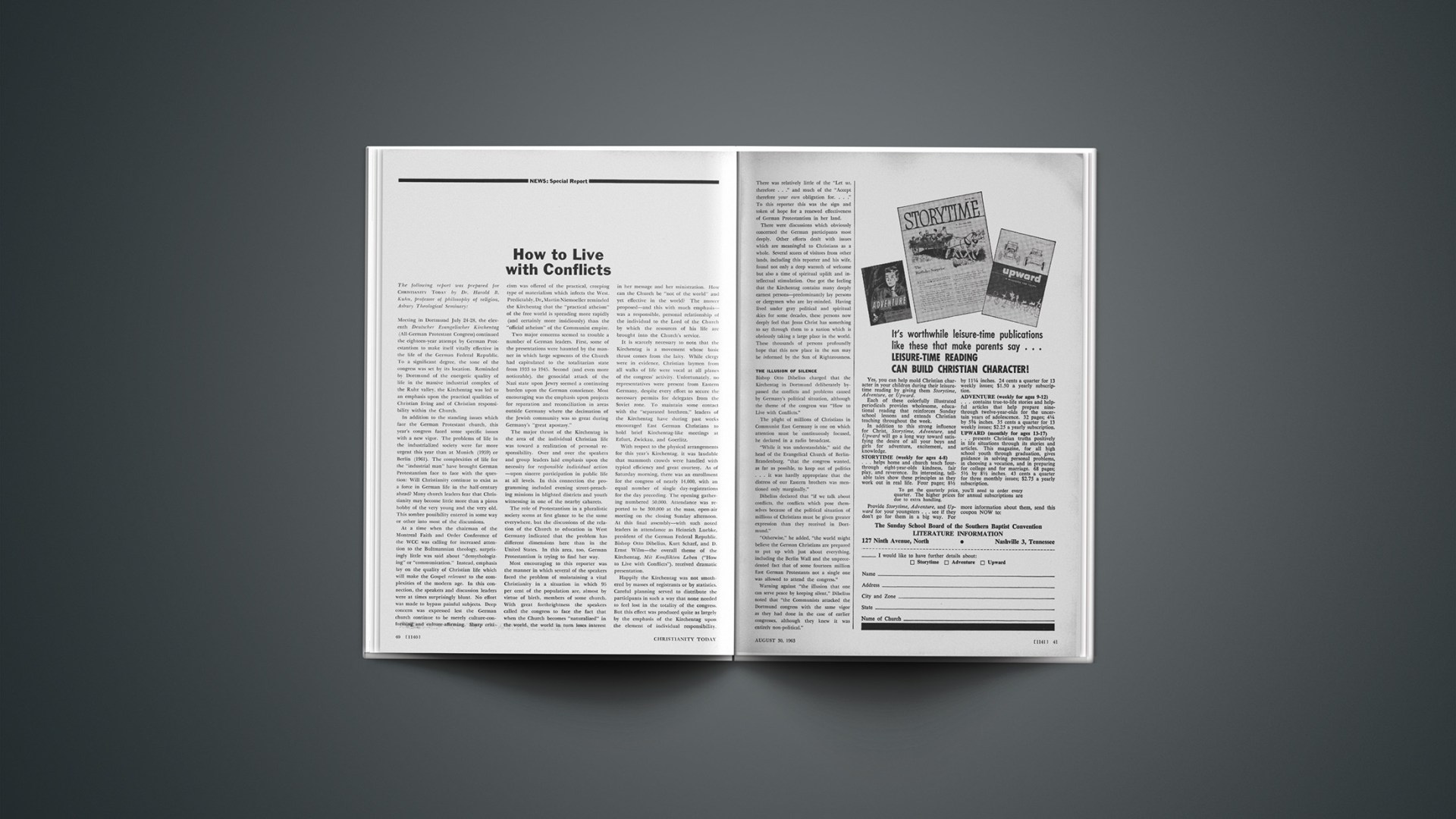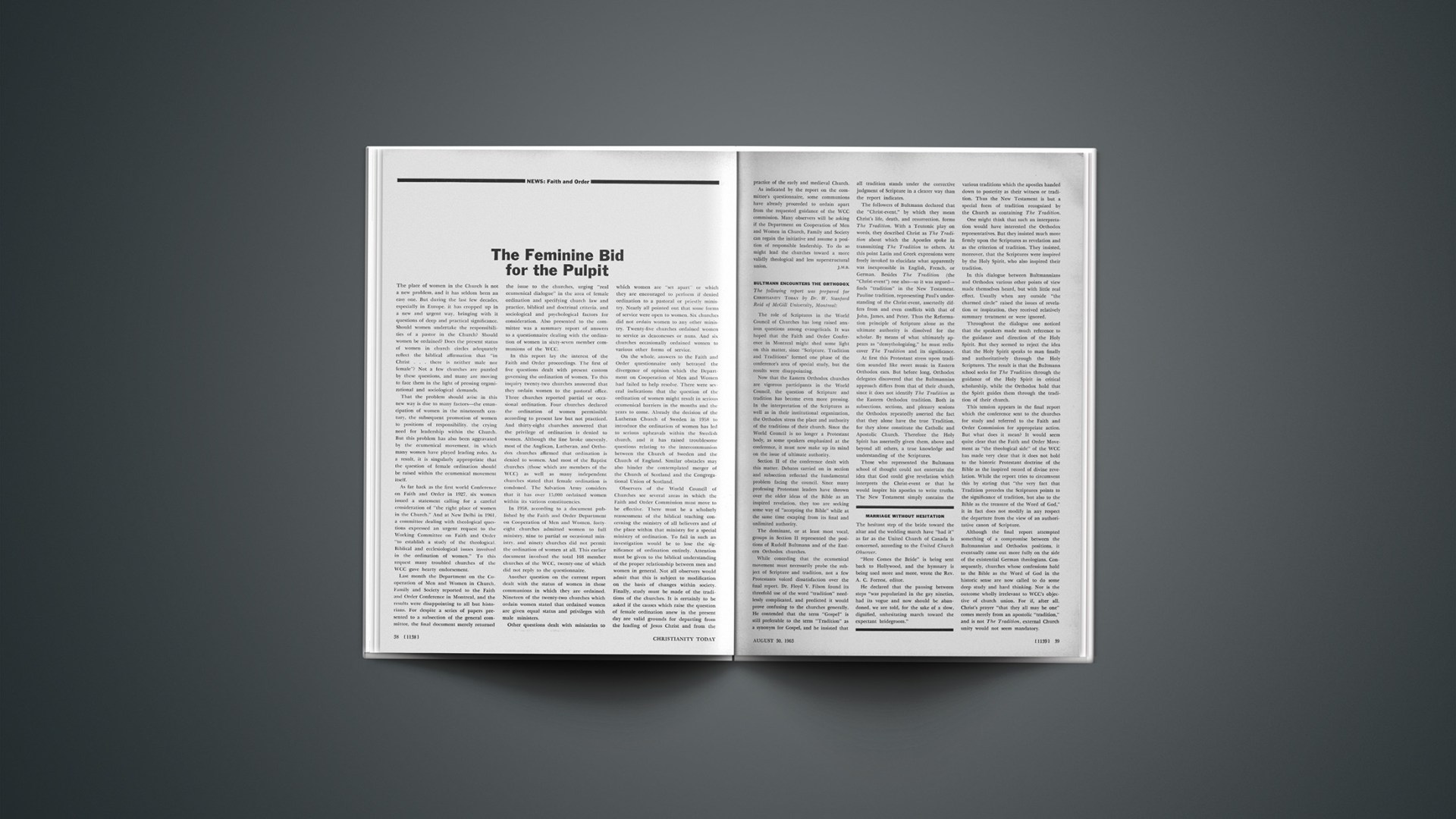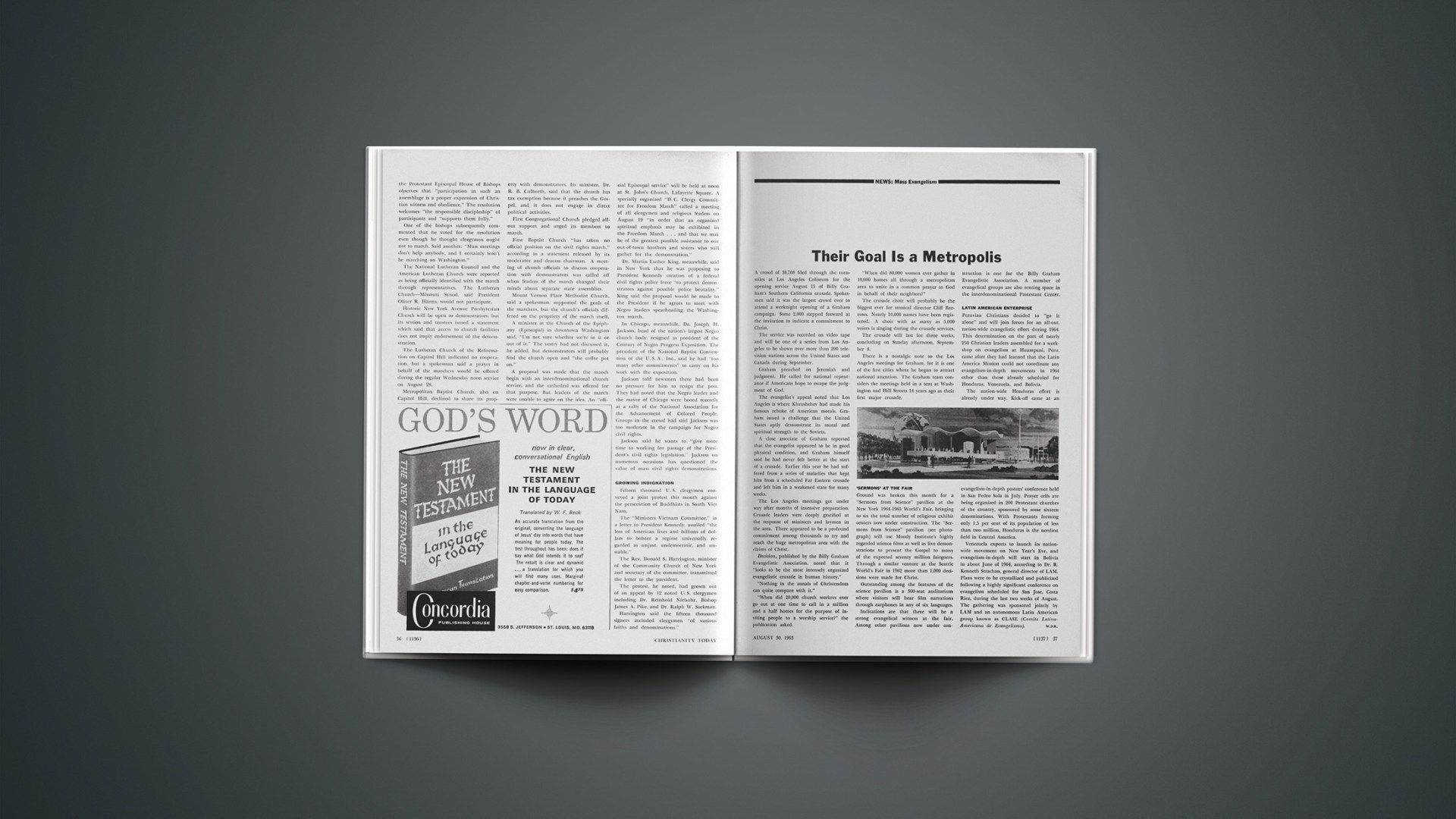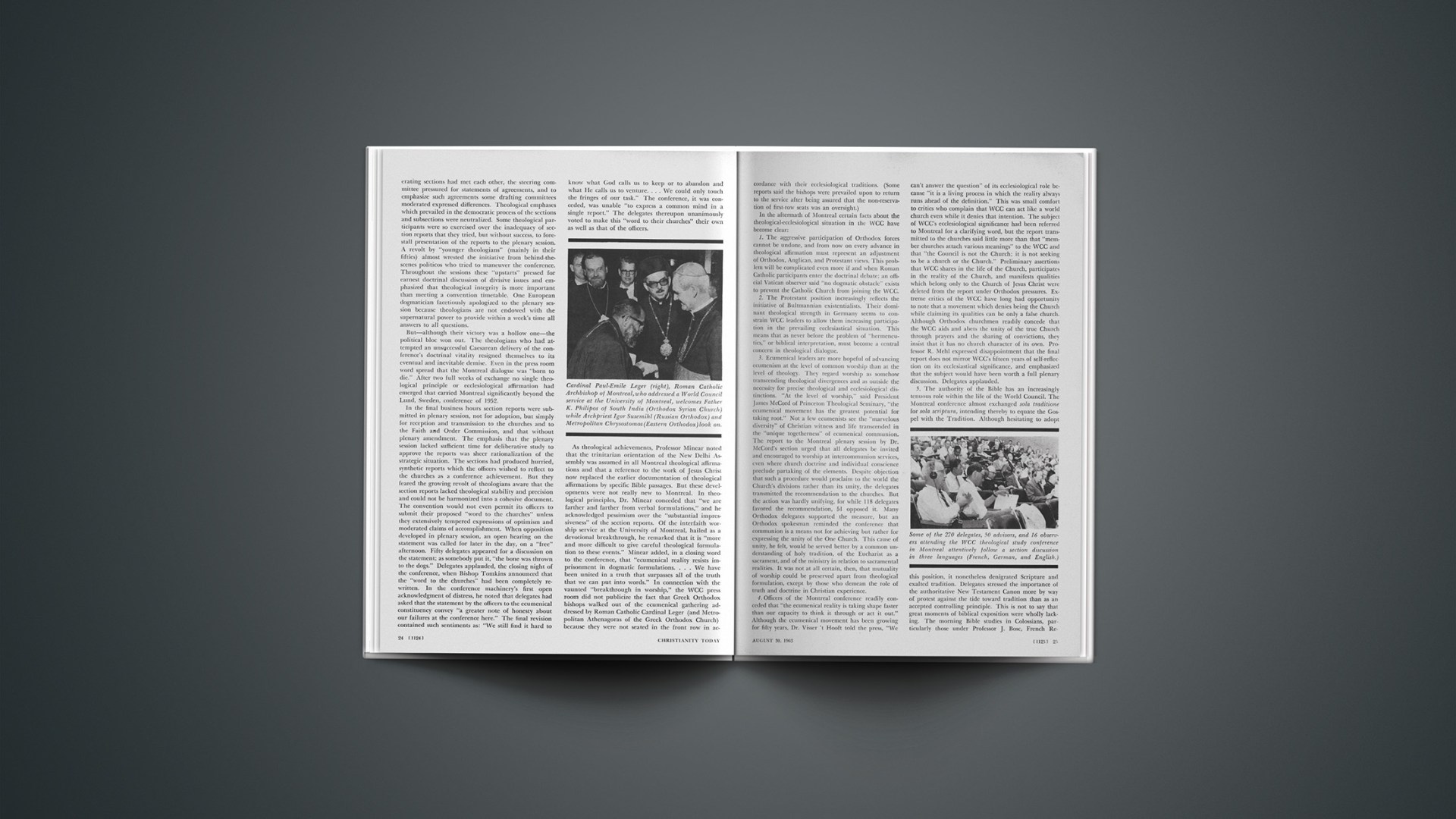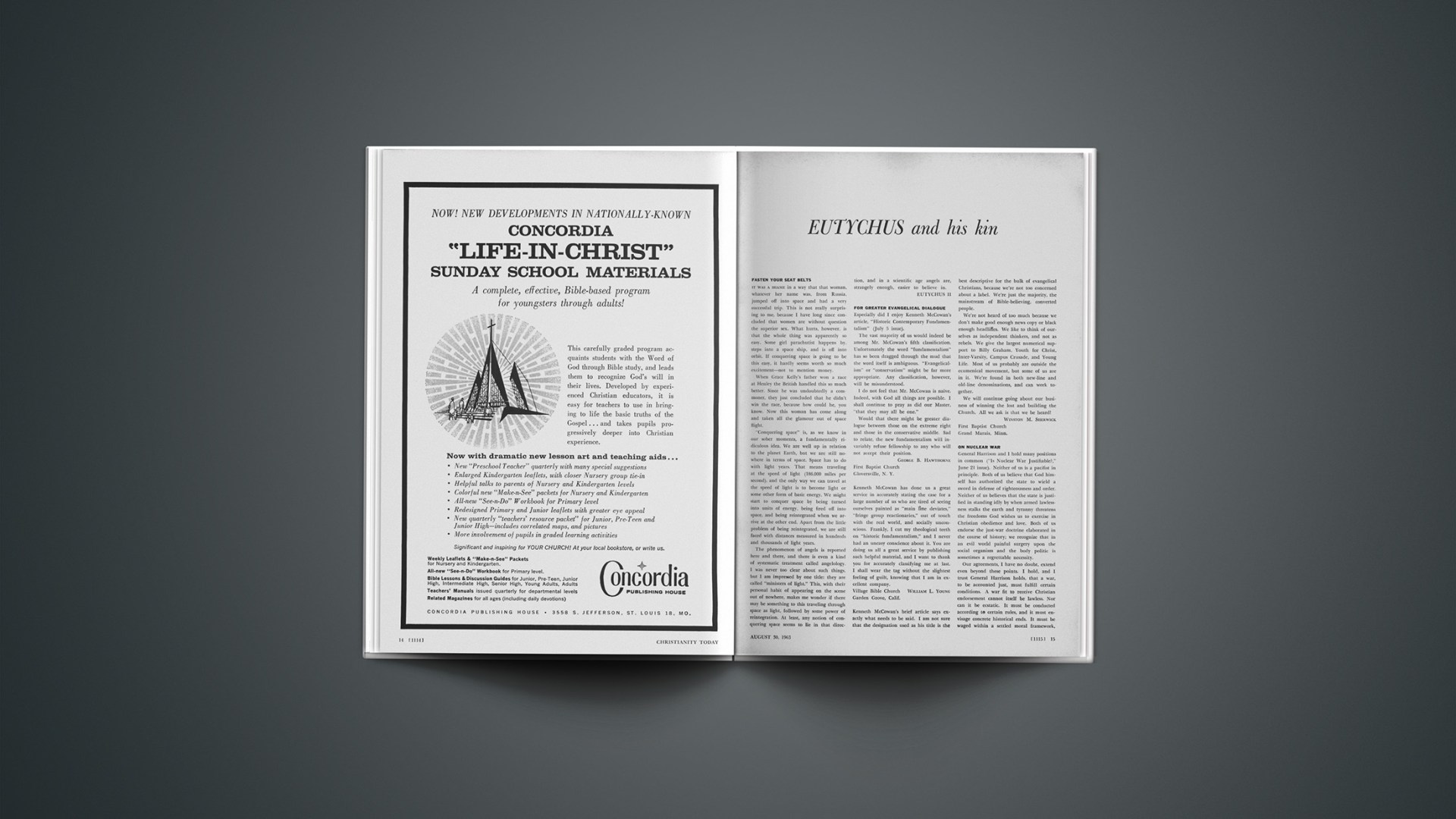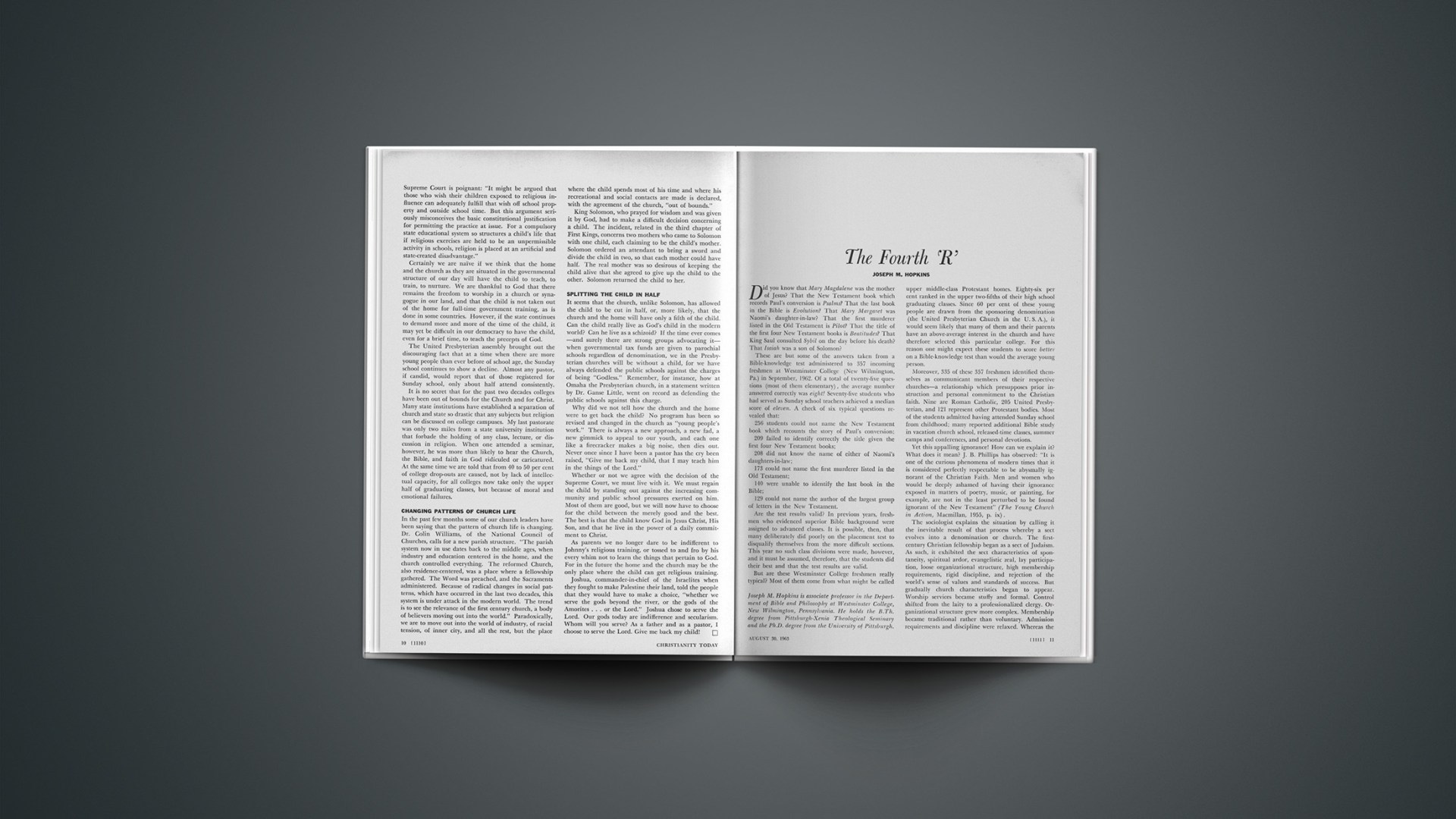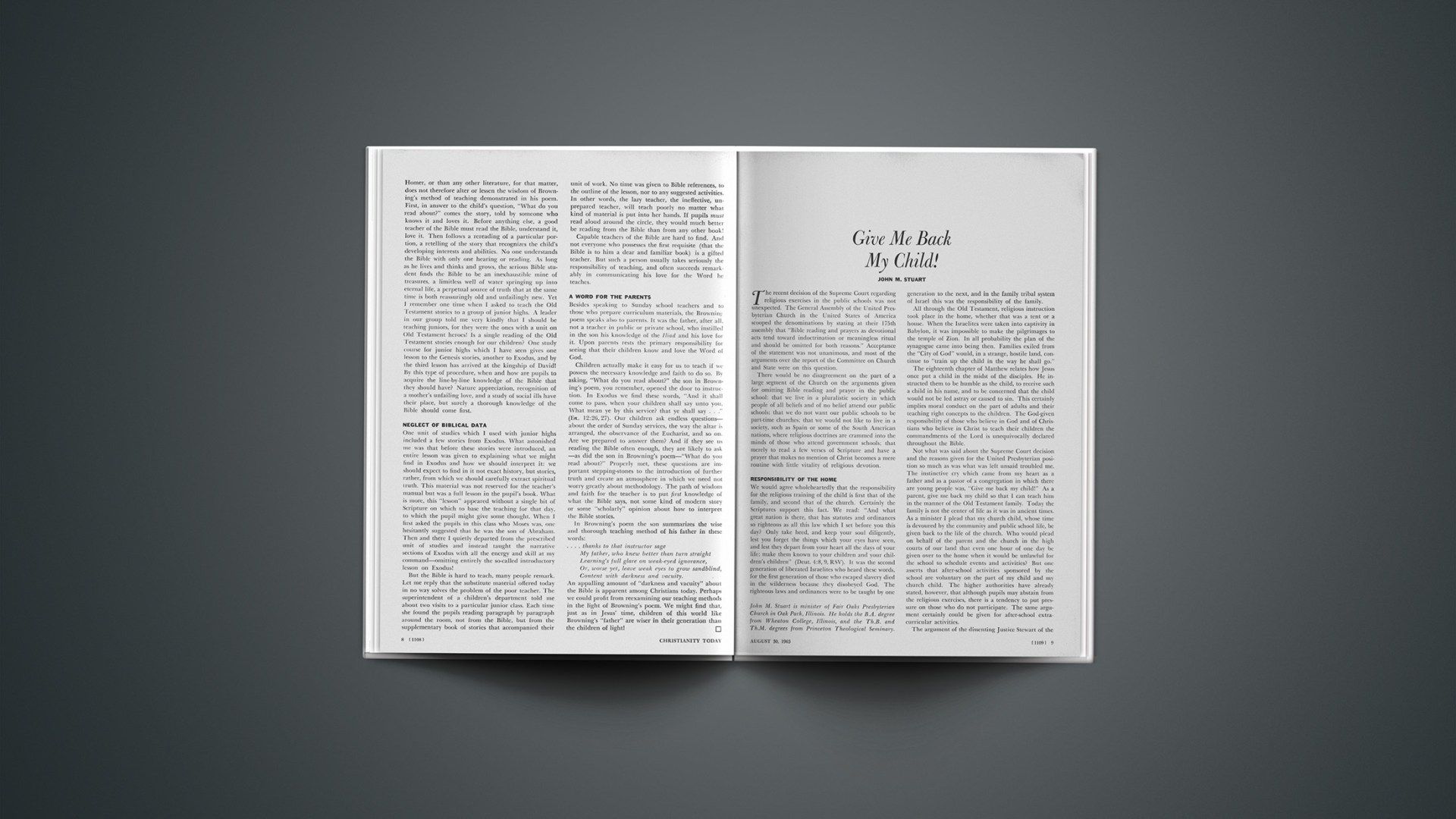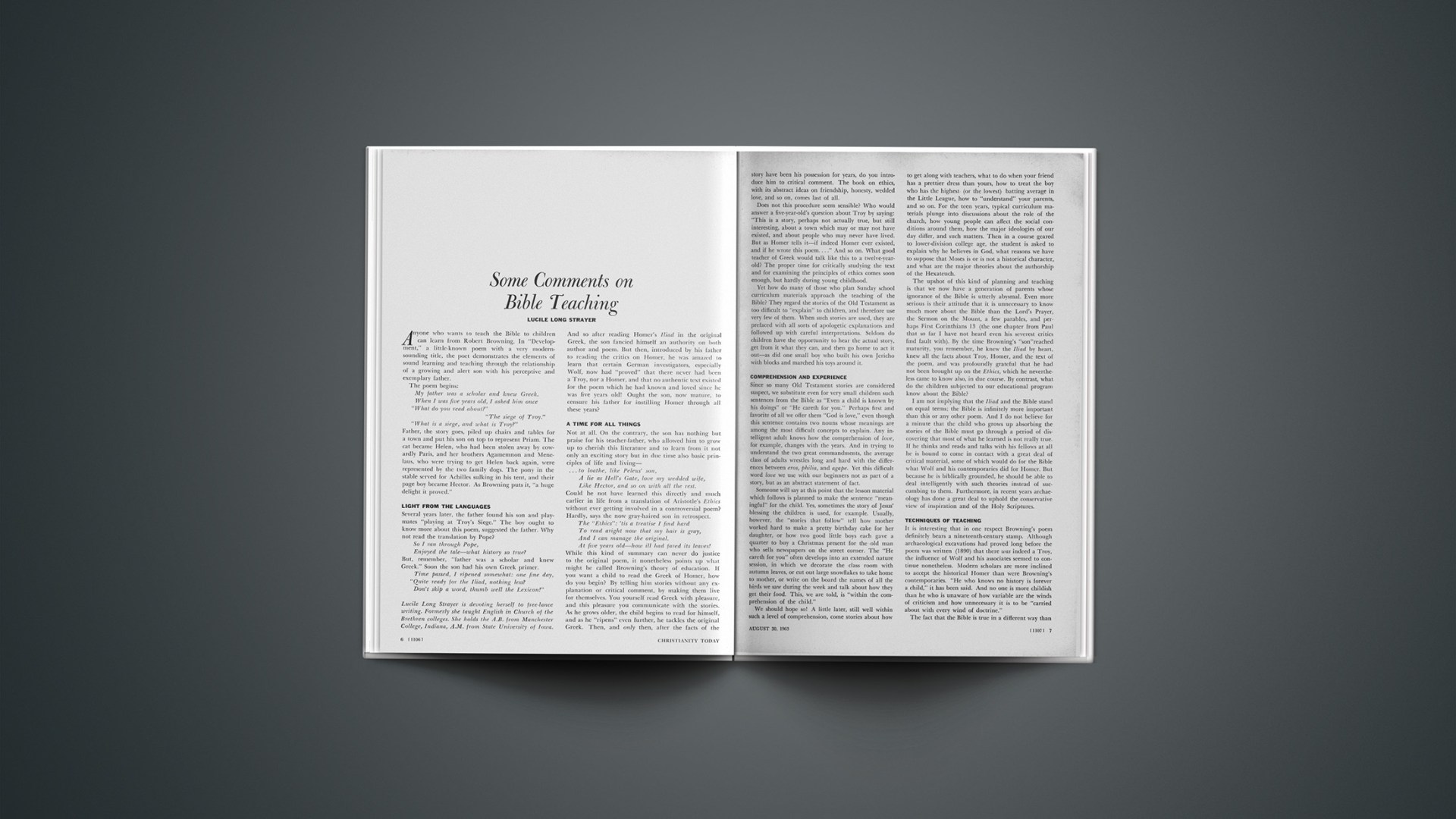The place of women in the Church is not a new problem, and it has seldom been an easy one. But during the last few decades, especially in Europe, it has cropped up in a new and urgent way, bringing with it questions of deep and practical significance. Should women undertake the responsibilities of a pastor in the Church? Should women be ordained? Does the present status of women in church circles adequately reflect the biblical affirmation that “in Christ … there is neither male nor female”? Not a few churches are puzzled by these questions, and many are moving to face them in the light of pressing organizational and sociological demands.
That the problem should arise in this new way is due to many factors—the emancipation of women in the nineteenth century, the subsequent promotion of women to positions of responsibility, the crying need for leadership within the Church. But this problem has also been aggravated by the ecumenical movement, in which many women have played leading roles. As a result, it is singularly appropriate that the question of female ordination should be raised within the ecumenical movement itself.
As far back as the first world Conference on Faith and Order in 1927, six women issued a statement calling for a careful consideration of “the right place of women in the Church.” And at New Delhi in 1961, a committee dealing with theological questions expressed an urgent request to the Working Committee on Faith and Order “to establish a study of the theological. Biblical and ecclesiological issues involved in the ordination of women.” To this request many troubled churches of the WCC gave hearty endorsement.
Last month the Department on the Cooperation of Men and Women in Church. Family and Society reported to the Faith and Order Conference in Montreal, and the results were disappointing to all but historians. For despite a series of papers presented to a subsection of the general committee, the final document merely returned the issue to the churches, urging “real ecumenical dialogue” in the area of female ordination and specifying church law and practice, biblical and doctrinal criteria, and sociological and psychological factors for consideration. Also presented to the committee was a summary report of answers to a questionnaire dealing with the ordination of women in sixty-seven member communions of the WCC.
In this report lay the interest of the Faith and Order proceedings. The first of five questions dealt with present custom governing the ordination of women. To this inquiry twenty-two churches answered that they ordain women to the pastoral office. Three churches reported partial or occasional ordination. Four churches declared the ordination of women permissible according to present law but not practiced. And thirty-eight churches answered that the privilege of ordination is denied to women. Although the line broke unevenly, most of the Anglican, Lutheran, and Orthodox churches affirmed that ordination is denied to women. And most of the Baptist churches (those which are members of the WCC) as well as many independent churches stated that female ordination is condoned. The Salvation Army considers that it has over 15,000 ordained women within its various constituencies.
In 1958, according to a document published by the Faith and Order Department on Cooperation of Men and Women, forty-eight churches admitted women to full ministry, nine to partial or occasional ministry, and ninety churches did not permit the ordination of women at all. This earlier document involved the total 168 member churches of the WCC, twenty-one of which did not reply to the questionnaire.
Another question on the current report dealt with the status of women in those communions in which they are ordained. Nineteen of the twenty-two churches which ordain women stated that ordained women are given equal status and privileges with male ministers.
Other questions dealt with ministries to which women are “set apart” or which they are encouraged to perform if denied ordination to a pastoral or priestly ministry. Nearly all pointed out that some forms of service were open to women. Six churches did not ordain women to any other ministry. Twenty-five churches ordained women to service as deaconesses or nuns. And six churches occasionally ordained women to various other forms of service.
On the whole, answers to the Faith and Order questionnaire only betrayed the divergence of opinion which the Department on Cooperation of Men and Women had failed to help resolve. There were several indications that the question of the ordination of women might result in serious ecumenical barriers in the months and the years to come. Already the decision of the Lutheran Church of Sweden in 1958 to introduce the ordination of women has led to serious upheavals within the Swedish church, and it has raised troublesome questions relating to the intercommunion between the Church of Sweden and the Church of England. Similar obstacles may also hinder the contemplated merger of the Church of Scotland and the Congregational Union of Scotland.
Observers of the World Council of Churches see several areas in which the Faith and Order Commission must move to be effective. There must be a scholarly reassessment of the biblical teaching concerning the ministry of all believers and of the place within that ministry for a special ministry of ordination. To fail in such an investigation would be to lose the significance of ordination entirely. Attention must be given to the biblical understanding of the proper relationship between men and women in general. Not all observers would admit that this is subject to modification on the basis of changes within society. Finally, study must be made of the traditions of the churches. It is certainly to be asked if the causes which raise the question of female ordination anew in the present day are valid grounds for departing from the leading of Jesus Christ and from the practice of the early and medieval Church.
As indicated by the report on the committee’s questionnaire, some communions have already proceeded to ordain apart from the requested guidance of the WCC commission. Many observers will be asking if the Department on Cooperation of Men and Women in Church, Family and Society can regain the initiative and assume a position of responsible leadership. To do so might lead the churches toward a more validly theological and less superstructural union.
Bultmann Encounters The Orthodox
The following report was prepared forCHRISTIANITY TODAYby Dr. W. Stanford Reid of McGill University, Montreal:
The role of Scriptures in the World Council of Churches has long raised anxious questions among evangelicals. It was hoped that the Faith and Order Conference in Montreal might shed some light on this matter, since “Scripture, Tradition and Traditions” formed one phase of the conference’s area of special study, but the results were disappointing.
Now that the Eastern Orthodox churches are vigorous participants in the World Council, the question of Scripture and tradition has become even more pressing. In the interpretation of the Scriptures as well as in their institutional organization, the Orthodox stress the place and authority of the traditions of their church. Since the World Council is no longer a Protestant body, as some speakers emphasized at the conference, it must now make up its mind on the issue of ultimate authority.
Section II of the conference dealt with this matter. Debates carried on in section and subsection reflected the fundamental problem facing the council. Since many professing Protestant leaders have thrown over the older ideas of the Bible as an inspired revelation, they too are seeking some way of “accepting the Bible” while at the same time escaping from its final and unlimited authority.
The dominant, or at least most vocal, groups in Section II represented the positions of Rudolf Bultmann and of the Eastern Orthodox churches.
While conceding that the ecumenical movement must necessarily probe the subject of Scripture and tradition, not a few Protestants voiced dissatisfaction over the final report. Dr. Floyd V. Filson found its threefold use of the word “tradition” needlessly complicated, and predicted it would prove confusing to the churches generally. He contended that the term “Gospel” is still preferable to the term “Tradition” as a synonym for Gospel, and he insisted that all tradition stands under the corrective judgment of Scripture in a clearer way than the report indicates.
The followers of Bultmann declared that the “Christ-event,” by which they mean Christ’s life, death, and resurrection, forms The Tradition. With a Teutonic play on words, they described Christ as The Tradition about which the Apostles spoke in transmitting The Tradition to others. At this point Latin and Greek expressions were freely invoked to elucidate what apparently was inexpressible in English, French, or German. Besides The Tradition (the “Christ-event”) one also—so it was argued—finds “tradition” in the New Testament. Pauline tradition, representing Paul’s understanding of the Christ-event, assertedly differs from and even conflicts with that of John, James, and Peter. Thus the Reformation principle of Scripture alone as the ultimate authority is dissolved for the scholar. By means of what ultimately appears as “demythologizing,” he must rediscover The Tradition and its significance.
At first this Protestant stress upon tradition sounded like sweet music in Eastern Orthodox ears. But before long, Orthodox delegates discovered that the Bultmannian approach differs from that of their church, since it does not identify The Tradition as the Eastern Orthodox tradition. Both in subsections, sections, and plenary sessions the Orthodox repeatedly asserted the fact that they alone have the true Tradition, for they alone constitute the Catholic and Apostolic Church. Therefore the Holy Spirit has assertedly given them, above and beyond all others, a true knowledge and understanding of the Scriptures.
Those who represented the Bultmann school of thought could not entertain the idea that God could give revelation which interprets the Christ-event or that he would inspire his apostles to write truths. The New Testament simply contains the various traditions which the apostles handed down to posterity as their witness or tradition. Thus the New Testament is but a special form of tradition recognized by the Church as containing The Tradition.
MARRIAGE WITHOUT HESITATION
The hesitant step of the bride toward the altar and the wedding march have “had it” as far as the United Church of Canada is concerned, according to the United Church Observer.
“Here Comes the Bride” is being sent back to Hollywood, and the hymnary is being used more and more, wrote the Rev. A. C. Forrest, editor.
He declared that the pausing between steps “was popularized in the gay nineties, had its vogue and now should be abandoned, we are told, for the sake of a slow, dignified, unhesitating march toward the expectant bridegroom.”
One might think that such an interpretation would have interested the Orthodox representatives. But they insisted much more firmly upon the Scriptures as revelation and as the criterion of tradition. They insisted, moreover, that the Scriptures were inspired by the Holy Spirit, who also inspired their tradition.
In this dialogue between Bultmannians and Orthodox various other points of view made themselves heard, but with little real effect. Usually when any outside “the charmed circle” raised the issues of revelation or inspiration, they received relatively summary treatment or were ignored.
Throughout the dialogue one noticed that the speakers made much reference to the guidance and direction of the Holy Spirit. But they seemed to reject the idea that the Holy Spirit speaks to man finally and authoritatively through the Holy Scriptures. The result is that the Bultmann school seeks for The Tradition through the guidance of the Holy Spirit in critical scholarship, while the Orthodox hold that the Spirit guides them through the tradition of their church.
This tension appears in the final report which the conference sent to the churches for study and referred to the Faith and Order Commission for appropriate action. But what does it mean? It would seem quite clear that the Faith and Order Movement as “the theological side” of the WCC has made very clear that it does not hold to the historic Protestant doctrine of the Bible as the inspired record of divine revelation. While the report tries to circumvent this by stating that “the very fact that Tradition precedes the Scriptures points to the significance of tradition, but also to the Bible as the treasure of the Word of God,” it in fact does not modify in any respect the departure from the view of an authoritative canon of Scripture.
Although the final report attempted something of a compromise between the Bultmannian and Orthodox positions, it eventually came out more fully on the side of the existential German theologians. Consequently, churches whose confessions hold to the Bible as the Word of God in the historic sense are now called to do some deep study and hard thinking. Nor is the outcome wholly irrelevant to WCC’s objective of church union. For if, after all, Christ’s prayer “that they all may be one” comes merely from an apostolic “tradition,” and is not The Tradition, external Church unity would not seem mandatory.

